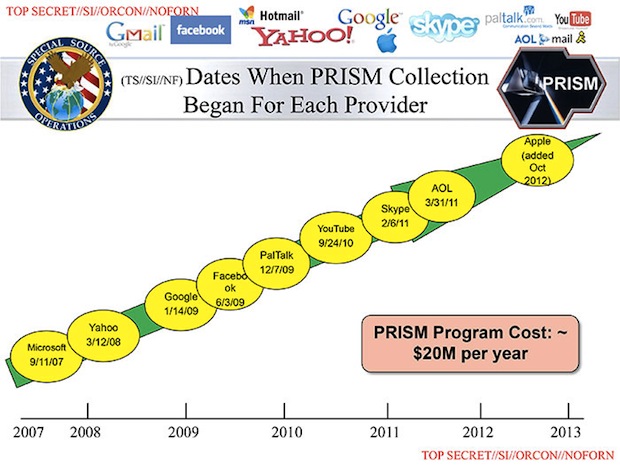Google and Facebook did not give intelligence direct access to the servers, but created “secure portals” for it

Nine companies accused of participating in the PRISM intelligence program yesterday denied the allegations, saying they did not provide “direct access” to their servers. However, according to The New York Times, it's all about the wording.
As The Verge writes with reference to The Times, in fact, the government turned to companies such as Google, Apple, Microsoft and Facebook, with the question of developing digital secure portals to which companies could transfer data and where later they could access government.
According to Times sources, most of the companies mentioned at first resisted the implementation of such a service, but in the end many of them agreed to participate to one degree or another (Twitter reportedly refused to participate). Moreover, both Google and Facebook took part in the discussion of plans for the development of separate “secure portals” - and Facebook supposedly already created such a system, despite today's indignant post of Mark Zuckerberg .
In negotiations on the development of systems that took place this year, Martin Dempsey, chairman of the Joint Chiefs of Staff (a body of the US Department of Defense), participated. He came to Silicon Valley to meet with company executives.
As for the rebuttals from the companies, many noticed that the texts of the statements by Apple, Google and Facebook contained almost verbatim identical phrases. All of them claim that they have never heard of PRISM, that they do not provide direct access to their servers and that they submitted to separate judicial requests for information. With the new revelations from The Times, these statements may well be technically true.
Companies may not have been aware of the name of the PRISM program when developing systems - and The Times reports that those who knew about the systems, in any case, undertook not to disclose information about them. A separate data warehouse is neither “direct access” nor a “backdoor”, and data transfer through these stores will be through access provided in response to specific requests under the Foreign Intelligence Surveillance Act.
According to The Times, last year under the FISA law, more than 1800 warrants were issued, and in one of these cases, the NSA sent an agent to the headquarters of an unnamed company to monitor a cyber attack. There, an agent installed a program developed in the government on the company’s server and downloaded the information in a few weeks on a laptop. The NSA is said to also be able to receive real-time data from companies upon request.
